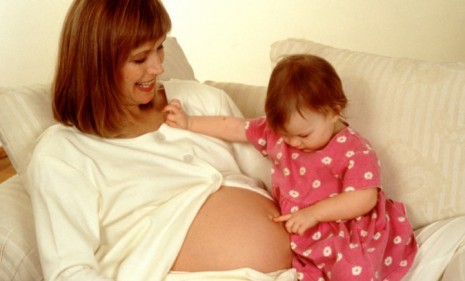Do back-to-back pregnancies cause autism?
A new study in the journal Pediatrics finds that children conceived less than a year after the birth of a sibling have a higher risk of developing the disease

A free daily email with the biggest news stories of the day – and the best features from TheWeek.com
You are now subscribed
Your newsletter sign-up was successful
Just a week after an influential 1998 study linking autism to vaccines was revealed to be fraudulent, another possible cause of autism has been identified: Having children one right after the other. Kids conceived less than 12 months after the birth of an older sibling are three times as likely to be diagnosed with autism than their peers, Columbia University researchers report in the journal Pediatrics. Should parents take this study to heart? (Watch a report about the new research)
How did the researchers come up with these numbers?
Lead author Keely Cheslack-Postava and her colleagues examined the medical records of 662,730 second-born children in California between 1992 and 2002. The closer those children were born to their older siblings, the higher the risk of autism, regardless of maternal age and education level, birth weight, or other factors. Compared with children conceived at least three years after their older sibling's birth, the autism rate was three times as high for those conceived within 12 months, nearly double for 12-23 months, and one quarter as high for those conceived 24 to 35 months later.
The Week
Escape your echo chamber. Get the facts behind the news, plus analysis from multiple perspectives.

Sign up for The Week's Free Newsletters
From our morning news briefing to a weekly Good News Newsletter, get the best of The Week delivered directly to your inbox.
From our morning news briefing to a weekly Good News Newsletter, get the best of The Week delivered directly to your inbox.
What do back-to-back births have to do with autism?
"We don't know what causes this," says Columbia sociologist Peter Bearman, one of the researchers, only that the correlation is "really profound." But closely spaced births have been tied to other health issues, like low birth weight, premature delivery, and schizophrenia. One theory is that it takes time for a new mother's uterus to recover from pregnancy — especially in replenishing stores of folate, iron, and other nutrients — so second kids may get insufficient doses of brain-development nutrients if they are conceived too early.
Any other theories about the connection?
Yes. The researchers also suggest that parents might be more attuned to the development of their second child if he or she arrives soon after kid No. 1, which could lead to earlier diagnoses of autism. Or it could be "another process that hasn't been described or discovered yet," says Bearman.
A free daily email with the biggest news stories of the day – and the best features from TheWeek.com
Is this good news for fighting autism?
It could be. If the problem is a shortfall of nutrition in the mother's system, additional supplements could prevent autism. But "as with any of the many theories out there about 'what causes autism,' this new study seems to apply in a few... cases, and not at all in others," says Kristina Chew in Care2. So let's add this theory to all the others — "highways, TV, cell phones, alcohol, and you name it" — and admit this probably isn't the sole cause of the disorder.
So, should parents take this into account when planning a family?
That's a great question to bring up with your doctor, says Alice Park in Time. For some older women, "their risk of birth complications or having children with birth defects increases the longer they wait between pregnancies," and that may outweigh autism concerns. Besides, the findings are "preliminary," says Dr. Fred Volkmar at Yale. And until they have been replicated, parents shouldn't bank on the one study. That said, "the party line used to be to wait three years between pregnancies, and that is still not bad advice."
Sources: Wall Street Journal, MSNBC, WebMD, NY Daily News, Time, Care2